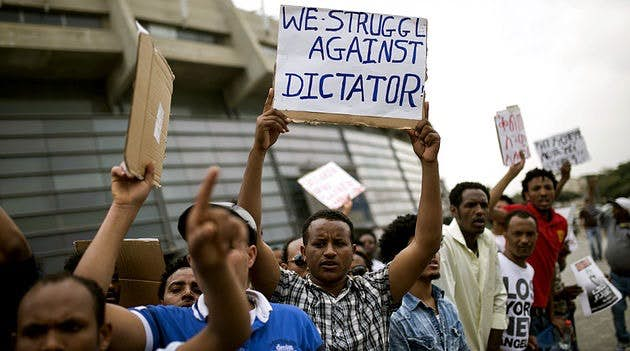NEW YORK — Last month marked 15 years since the Eritrean government arbitrarily detained a group of 11 independent journalists in secret prisons, effectively bringing about the end of independent press in the country. Human Rights Foundation (HRF) joins the UN Special Rapporteur on the situation of human rights in Eritrea in calling on the Eritrean government to urgently provide information on the whereabouts of the detainees and to release them immediately. The journalists were arrested in September 2001 following the publication of an open letter denouncing President Isais Afeworki’s dictatorial rule.
“Since gaining independence from Ethiopia in 1993, Eritreans have been ruled by fear. Afwerki’s dictatorial state — whose cruelty has often been compared to that of Kim Jong-un’s regime in North Korea — has made systematic repression, arbitrary detention, enforced disappearance, torture, and rape common practices, turning Eritrea into one of the most repressive countries in the world,” said HRF president Thor Halvorssen. “It is time that the Eritrean despot be brought to justice like his fellow dictators, Hissene Habre of Chad and Laurent Gbagbo of the Ivory Coast. Impunity must end and innocent detainees should be released immediately,” he added.
The journalists have remained incommunicado since they were first arrested in 2001 without charge or trial. The government has justified their detention by claiming that they posed a threat to national security. A 2012 report by Reporters Without Borders claims that seven members of the group have died while in detention, but the government has refused to disclose any information about their whereabouts or the reported deaths. In June 2016, the Eritrean foreign minister stated that all political prisoners are alive and will be tried “when the government decides.”
“The ruthless imprisonment of these journalists by the Eritrean government, followed by the regime’s refusal to disclose the fate and whereabouts of the detainees for 15 years, qualify as the crime of enforced disappearance according the 2006 International Convention for the Protection of All Persons from Enforced Disappearance,” said Celine Assaf Boustani, international legal associate at HRF. “Although Eritrea is not a state party to this convention, the definitions in the convention codify general international law, so the convention’s content is binding upon Eritrea,” she added.
Earlier this year, the UN Commission of Inquiry on human rights in Eritrea concluded in its report that “there are reasonable grounds to believe that Eritrean officials have committed the crime of enforced disappearance, a crime against humanity, in a persistent, widespread, and systematic manner since May 1991.”
Human Rights Foundation (HRF) is a nonpartisan nonprofit organization that promotes and protects human rights globally, with a focus on closed societies.
Contact: Noemi Gonzalo-Bilbao, (212) 246-8486, noemi@humanrightsfdn.wpengine.com.
